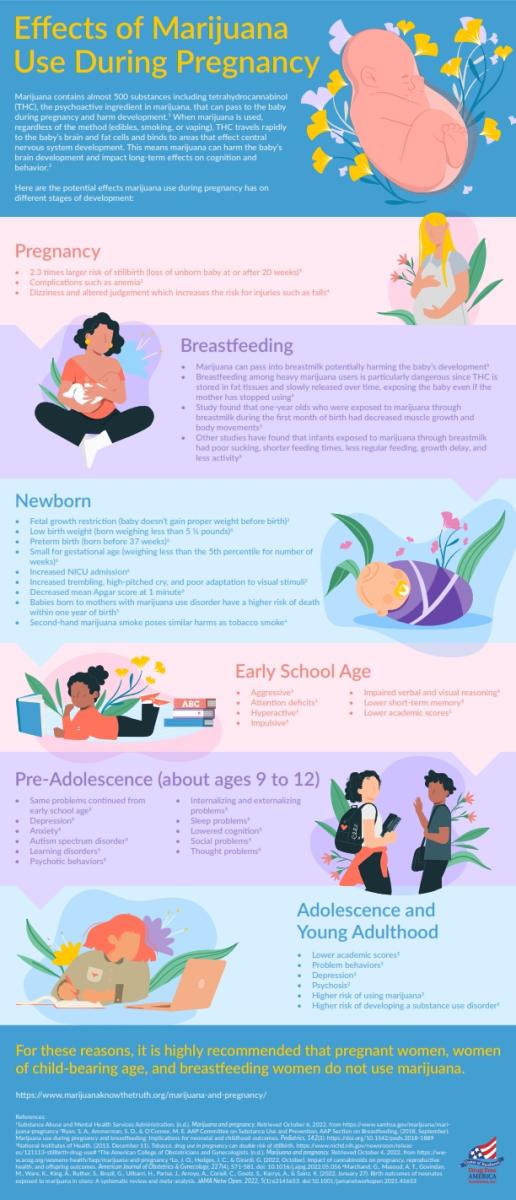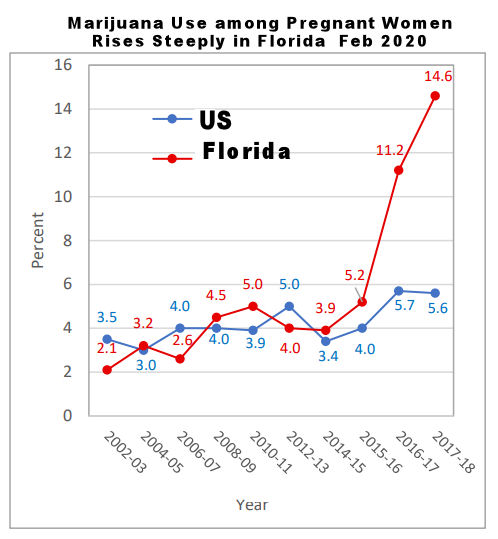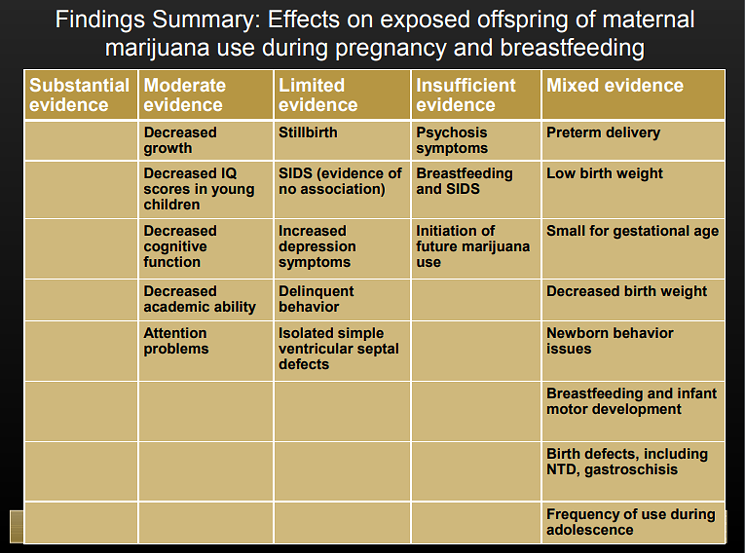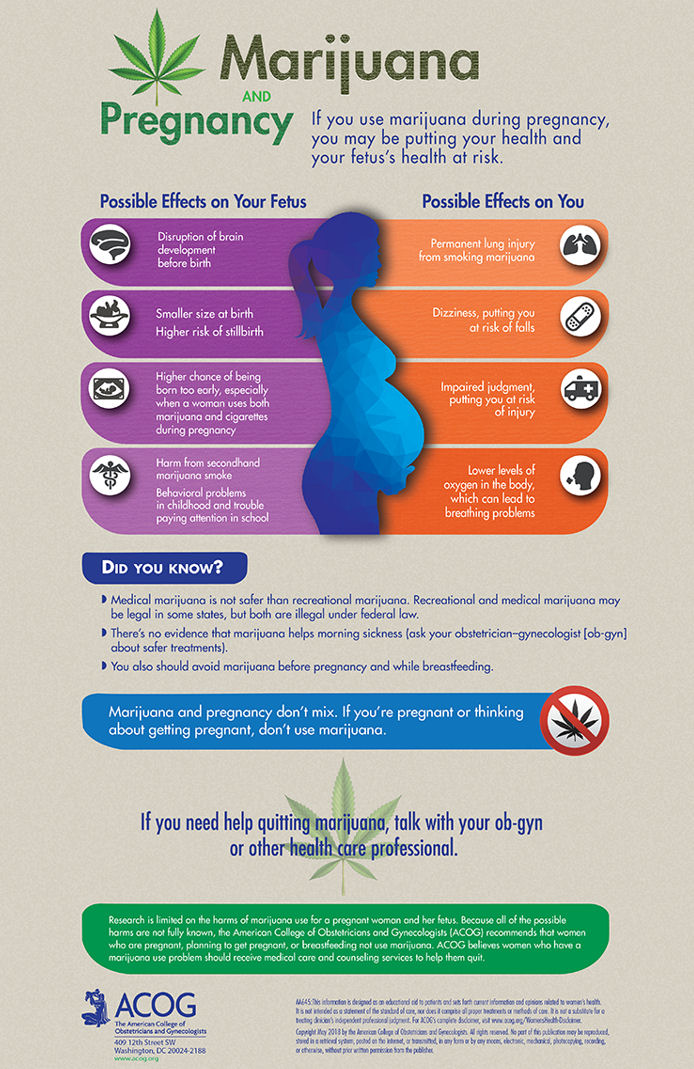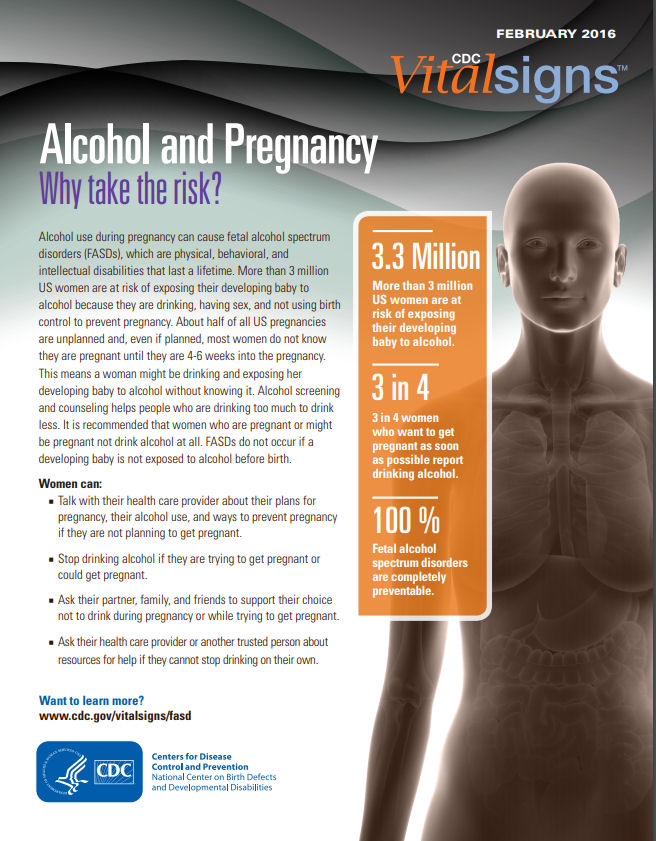Pregnancy
Current sort has key articles at the top. Click on "Article Date" to sort by date, click on specific "tag" to view all articles in that category.
| Title/Link | |
|---|---|
|
DFAF- Marijuana and Pregnancy- Know the Truth 11/24/2023 |
Marijuana and the Risks to Pregnancy & Breastfeeding Marijuana contains almost 500 components including the psychoactive ingredient THC that can pass through the placenta to the baby during pregnancy, causing harm to the fetus.
Pregnancy, Breastfeeding |
|
CDC- Marijuana and Pregnancy 11/24/2023 |
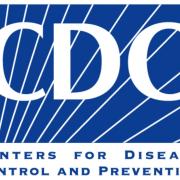 What are the potential health effects of using marijuana during my pregnancy? Pregnancy |
|
Recent Study Reveals the Harms of Legalization of Marijuana in Illinois And the US 11/16/2023 |
Pregnancy, car crashes, Children, pediatrics, Delta-8, Delta-8 Children |
|
Prenatal cannabinoid exposure: why expecting individuals should take a pregnancy pause from using cannabinoid products 10/01/2023 |
Pregnancy |
|
DFAF-Pregnancy and Marijuana 03/17/2023 |
Pregnancy, Drug Free America |
|
DFA-Marijuana and Pregnancy 02/09/2023 |
Pregnancy |
|
SAMSHA- Marijuana and Pregnancy 02/09/2023 |
Pregnancy |
|
Underplaying the dangers of cannabis for women of childbearing age is sexist and pregnancy discrimination 02/01/2023 |
Cannabis can cross the placental and blood-brain barriers and is excreted in breast milk. The scope is wider than pregnancy alone as it accumulates and is active for many weeks. Pregnancy |
|
Association of Mental Health Burden With Prenatal Cannabis Exposure From Childhood to Early Adolescence: Longitudinal Findings From the Adolescent Brain Cognitive Development (ABCD) Study 12/01/2022 |
Conclusions and relevance: This study suggests that prenatal cannabis exposure and its correlated factors are associated with greater risk for psychopathology during middle childhood. Cannabis use during pregnancy should be discouraged. prenatal, Pregnancy, mental health, study, Research, 2023 Presentation Dr Berry |
|
Long-term effects of prenatal cannabis exposure: Pathways to adolescent and adult outcomes 06/26/2022 |
Highlights Pregnancy, adolescent |
|
Cannabis legalization and cannabis-involved pregnancy hospitalizations in Colorado 03/01/2022 |
Research has found that prenatal cannabis use may adversely affect fetal growth and neurodevelopment, be associated with future learning and behavioral problems in children, and increase risk of neonatal morbidity. (Cornelius et al., 2002; Day et al., 1994; El Marroun et al., 2011; Fried and Smith, 2001; Fried et al., 1999; Fried et al., 2003; Fried et al., 1997; Goldschmidt et al., 2000; Goldschmidt et al., 2008; Goldschmidt et al., 2012; Metz et al., 2017; Noland et al., 2005; Willford et al., 2010; Ryan et al., 2018; El Marroun et al., 2018) Several US organizations, including the American College of Obstetricians and Gynecologists and the American Academy of Pediatrics, recommend abstinence from cannabis use during pregnancy. (Ryan et al., 2018; Gynecologists, T.A.C.O.O.A, 2020) Despite these recommendations, there are concerns that the trend of cannabis use during pregnancy will continue to increase as more states and countries legalize cannabis and allow for commercial sales through dispensaries. (Mark and Terplan, 2017) Pregnancy, science direct, Research |
|
Underplaying the dangers of cannabis for women of childbearing age is sexist and pregnancy discrimination 02/22/2022 |
Cannabis can cross the placental and blood-brain barriers and is excreted in breast milk. The scope is wider than pregnancy alone as it accumulates and is active for many weeks. Pregnancy |
|
Maternal Cannabis Use During Pregnancy and Maternal and Neonatal Outcomes: A Retrospective Cohort Study 02/04/2022 |
Results Conclusions Pregnancy |
|
Marijuana Use among Pregnant Women Rises Steeply in Florida 01/17/2022 |
Though research among pregnant women and marijuana-exposed neonates is limited, there is evidence to suggest that marijuana use may increase the risk of stillbirth and is associated with neurodevelopmental deficits in the infant. Evidence-based programs to prevent initiation of marijuana use should target women of childbearing age. In addition, THC passes from mother to baby through breastmilk; thus, cessation should continue post-partum.
Pregnancy, FDCF, 2022 Marijuana |
|
Prenatal Cannabinoid Exposure: Emerging Evidence of Physiological and Neuropsychiatric Abnormalities 01/17/2021 |
In human studies, the preponderance of evidence suggests that prenatal cannabinoid exposure is predictive of several adverse neonatal outcomes, most notably FGR Fetal growth restriction and LBW low birth weight. Pregnancy, 2022 Marijuana, frontiers in psychiatry |
|
Marijuana and Breastfeeding 10/13/2020 |
Updated information and brochure Pregnancy, Breastfeeding |
|
Maternal cannabis use in pregnancy 08/10/2020 |
Maternal cannabis use in pregnancy and child neurodevelopmental outcomes We link pregnancy and birth data to provincial health administrative databases to ascertain child neurodevelopmental outcomes. We use matching techniques to control for confounding and Cox proportional hazards regression models to examine associations between prenatal cannabis use and child neurodevelopment. Marijuana Use During Pregnancy Linked To Autism In Children: Study Pregnancy |
|
Cannabis use during pregnancy and its relationship with fetal developmental outcomes and psychiatric disorders. A systematic revie 02/17/2020 |
Very scientific and medical article. Pregnancy, PubMed, 2022 Marijuana |
|
An Overview of Cannabis Use in Pregnancy 01/16/2020 |
Consumption of cannabis during pregnancy results in cannabinoid placental crossing and accumulation in the fetal brain, and other organs, where it interferes with neurodevelopment and the endocannabinoid system. Use during the postnatal period can also lead to secretion in breast milk for extended periods (up to a week) after last use. From retrospective studies, we know prenatal cannabis ingestion has been associated with anemia in the mothers as well as low birth weights, greater risk of preterm and stillbirths, as well as increased need for neonatal intensive care unit admissions. Pregnancy |
|
Surgeon general: Marijuana during pregnancy and adolescence is dangerous 08/07/2019 |
“No amount of marijuana use during pregnancy or adolescence is safe,” said Surgeon General Jerome Adams at a press conference. Pregnancy |
|
Self-reported Medical and Nonmedical Cannabis Use Among Pregnant Women in the United States 07/09/2019 |
Cannabis effects on fetal growth (eg, low birth weight and length) may be more pronounced in women who consume marijuana frequently, especially in the first and second trimesters.4 This study highlights the importance of screening and interventions for cannabis use among all pregnant women. Pregnancy, Volkow, PubMed |
|
Cannabis use during pregnancy 03/10/2019 |
Significant effects of prenatal cannabis exposure have been found on children's sleep, cognitive functions (memory and scholastic skills), as well as on executive (frontal lobe) functions (reasoning, attention, impulsivity, and motivation), and affective (depression) and anxiety symptoms throughout the stages of development. Following the presentation of two case vignettes, we integrate the published information on outcomes of maternal use of cannabis during pregnancy on the developing fetus and the "soft" neurological deficits and neuro-behavioral disturbances manifested by them from early childhood and evolving to peaks in adolescence. Taken together, these data serve to define what we call a heretofore unspecified "fetal cannabis spectrum disorder". Pregnancy, PubMed |
|
Is smoking pot while pregnant safe for the baby 02/14/2019 |
Researchers say psychoactive compounds in marijuana easily cross the placenta, exposing the fetus to perhaps 10 percent of the THC — tetrahydrocannabinol — that the mother receives, and higher concentrations if the mom uses pot repeatedly. NPR, Pregnancy |
|
How Marijuana Exposure Affects Developing Babies’ Brains 01/16/2019 |
Large-scale, longitudinal studies of humans whose mothers smoked marijuana once or more per week and experimental work on rodents exposed to cannabinoids in utero have yielded remarkably consistent intellectual and behavioral correlates of fetal exposure to this drug. Some exposed individuals exhibit deficits in memory, cognition, and measures of sociability. These aberrations appear during infancy and persist through adulthood and are tied to changes in the expression of multiple gene families, as well as more global measures of brain responsiveness and plasticity. Researchers currently consider these perturbations to be mediated by changes to the endocannabinoid system caused by the active compounds in cannabis. Pregnancy |
|
Number of new heroin 09/16/2018 |
There was more alarming news. Use of illegal drugs, including cocaine, marijuana, and opioids by pregnant women increased significantly between 2015 and 2017. About 7 percent of pregnant women reported using marijuana. Three percent said they used it daily. McCance-Katz says marijuana use is linked to fetal growth problems, preterm births, stillbirths, hyperactivity and impaired cognition in newborns. Pregnancy, heroin, McCance-Katz |
|
Pregnancy and Breastfeeding 09/08/2018 |
The importance of the published findings and the emerging research regarding the potential negative effects of marijuana on brain development are a cause for concern despite the limited research and are the basis for the following recommendations:
Pregnancy, Breastfeeding |
|
Is CBD Oil Harmful or Healing? What No One is Telling You 09/04/2018 |
CBD oil may potentially interact in a negative way with anti-epilepsy drugs. As of now, only in vitro (test tube) observations exist with no living organism testing proving safety. Drugs that may interact include:
hash oil, cbd oil, Pregnancy |
|
Marijuana and Pregnancy 08/01/2018 |
 DFAF, Pregnancy, Infographics |
|
Opioid Use During Pregnancy 07/16/2018 |
opioid, Pregnancy, DFAF |
|
Majority of Dispensary Workers Told Undercover Callers Pregnant Women Could Use Pot 05/09/2018 |
Researchers had two women conduct "mystery caller" phone conversations with employees at 400 dispensaries across the state, telling them that they were eight weeks pregnant and suffering from morning sickness. During the majority of those calls, the employees recommended the women use cannabis products. Pregnancy, Colorado |
|
Study shows prenatal cannabis use associated with low birth weights 04/23/2018 |
Pregnancy, study |
|
Review of the public health risks of widespread cannabis use 04/08/2018 |
1. Legalizing cannabis has been shown to increase the rates of motor vehicle accidents. Pregnancy, car crashes, mental health, pediatrics, Long-term, Doctors, Research, second hand smoke, smoking |
|
Committee Opinion No. 722: Marijuana Use During Pregnancy and Lactation 10/02/2017 |
There are insufficient data to evaluate the effects of marijuana use on infants during lactation and breastfeeding, and in the absence of such data, marijuana use is discouraged. Notably, 34–60% of marijuana users continue use during pregnancy, with many women believing that it is relatively safe to use during pregnancy and less expensive than tobacco It is difficult to be certain about the specific effects of marijuana on pregnancy and the developing fetus, in part because those who use it often use other drugs as well, including tobacco, alcohol, or illicit drugs, and in part because of other potential confounding exposures. Marijuana smoke contains many of the same respiratory disease-causing and carcinogenic toxins as tobacco smoke, often in concentrations several times greater than in tobacco smoke. Studies of marijuana exposure during pregnancy are potentially subject to reporting and recall bias, often relying on self-reported habits, including frequency, timing, and amount of marijuana use. women using marijuana at least weekly during pregnancy were significantly more likely to give birth to a newborn less than 2,500 Several studies noted statistically significantly smaller birth lengths and head circumferences as well as lower birth weights among exposed offspring Pregnancy, ACOG, 2022 Marijuana |
|
Study shows link between maternal marijuana use and low birth weight 05/01/2017 |
In a new study, researchers in London, Ontario found that women who used marijuana while pregnant were almost three times more likely to have an infant with low birth weight than women who did not use marijuana. Pregnancy |
|
Marijuana and Pregnancy 02/01/2017 |
Marijuana use during pregnancy can be harmful to your baby’s health. The chemicals in marijuana (in particular,tetrahydrocannabinol or THC) pass through your systemto your baby and can negatively affect your baby’s development. Pregnancy, 2017 Legislation, CDC |
|
Learn more about the risks marijuana use poses to your health. 01/29/2017 |
Here are just a few of the health effects you may want to know:
Brain, heart, lungs, mental health, poisoning, Pregnancy, driving, CDC, stroke, Side-Effects |
|
Marijuana and Opioid Conncection 10/16/2016 |
 Connection between legalization of marijuana and increase opioid addiction. Colorado, Pregnancy, opioid, video |
|
Alcohol and Pregnancy 09/13/2016 |
Alcohol use during pregnancy can cause fetal alcohol spectrum disorders (FASDs), which are physical, behavioral, and intellectual disabilities that last a lifetime. FASD is 100% preventable. alcohol, Pregnancy |
|
Cannabis use during pregnancy may affect brain development in offspring: Thicker prefrontal cortex 06/20/2016 |
Summary: Cannabis use during pregnancy is associated with abnormal brain structure in children, according to a new study. Compared with unexposed children, those who were prenatally exposed to cannabis had a thicker prefrontal cortex, a region of the brain involved in complex cognition, decision-making, and working memory. Pregnancy, Brain, science daily |
|
Study shows marijuana users twice as likely to give birth prematurely 05/08/2016 |
For the researchers of the study, the results present a “a major public health concern” as a number of pregnant women would report taking marijuana to alleviate morning sickness or nausea – without knowing of the adverse side-effects. http://www.sciencedirect.com/science/article/pii/S0890623816300715# Highlights
Pregnancy, Studies |
|
Cannabis During Pregnancy Impairs Baby's Brain Development 11/08/2015 |
Children whose mothers use marijuana during pregnancy have a higher risk of stunted growth and of developing ADHD, anxiety, and depression later in life. Pregnancy |
|
Marijuana exposure in utero has lifelong consequences 10/19/2015 |
But at a bare minimum, these findings suggest we should be avoiding recreational cannabis use during pregnancy. Utero, Pregnancy |
|
Mother's and marijuana use 10/01/2015 |
My main finding is that it's primarily women who were younger when they become mothers who do continue to use marijuana overtime. Also women who are depressed over longer periods of time, women who smoke, women who use more than the recommended amount of alcohol are more likely to continue to use marijuana while pregnant as well as when they're raising their children. So the take-home messages is to ask women about marijuana use. We know that marijuana use is considered more and more acceptable by women and that they may continue to use while they are pregnant and while they are having children. NIDA, Pregnancy, vidoe, Dr. Genna, Dr. Natacha, interview |
|
ASAM Public Policy Statement on Marijuana, Cannabinoids and Legalization 09/21/2015 |
Number Using Opioids and Marijuana on the Rise Chart: Colorado among states with growing heroin, prescription drug abuse problem
Pregnancy, addiction, cigarettes, edibles, Research, Studies |
|
Public Policy Statement on Marijuana, Cannabinoids and Legalization 09/21/2015 |
Given these statistics.... is legalization worth the consequences.... Research, legalization, asam, Long-term, Pregnancy, adolescent, youth, cigarettes |
|
Marijuana- Newborns and Pregnancy 07/17/2015 |
Infographics, Pregnancy |
|
ACOG: Doctors Should Urge Against Prenatal Marijuana Use 06/25/2015 |
Studies show that children exposed to marijuana in utero have lower scores on tests of visual problem-solving, visual and motor coordination, and visual analysis, compared with children not exposed to the drug, the report states. Prenatal marijuana exposure also has been associated with decreased attention span and behavioral problems. The nervous system of a human fetus can respond to the chemicals in marijuana within 14 weeks of gestation, and studies have shown that 14-year-olds are more likely to be marijuana users if their mothers used the drug during pregnancy. Pregnancy, Doctors, Research |
|
Fox News doctor: ‘Crack babies’ come from women ‘smoking this whole marijuana business’ 03/01/2015 |
Pregnancy, baby, youth, addiction, news video clip, news article |
|
Colorado’s ‘Pot Pregnancies’ Birthing New Generation of Crack Babies 02/24/2015 |
Colorado-0, Pregnancy, baby |
|
Marijuana report says pot dangerous for pregnant woman and baby 02/10/2015 |
"We found moderate evidence that maternal use of marijuana during pregnancy is associated with negative effects on exposed offspring, including decreased academic ability, cognitive function and attention. Importantly, these effects may not appear until adolescence. Pregnancy |
|
Medical Marijuana: The State of the Science 02/03/2015 |
State of the Science 190 resources Potency, Studies, lungs, cigarettes, Pregnancy |
|
It's not your mother's marijuana: effects on maternal-fetal health and the developing child. 01/30/2015 |
#no2Pot Effects, Pregnancy, PubMed |
|
Monitoring Health Concerns Related to Marijuana in Colorado: 2014 01/15/2015 |
Changes in Marijuana Use Patterns, Systematic Literature Review, and Possible Marijuana-Related Health Effects Colorado, health, Pregnancy, youth, Report, Statistical Reports |
|
Neuronal substrates and functional consequences of prenatal cannabis exposure 10/23/2014 |
Therefore, disrupted temporal and/or spatial precision of cannabinoid receptor activation, especially due to in utero cannabis exposure, can destabilize finely tuned signalling networks resulting in altered brain circuit formation and sensitivity to secondary insults. Pregnancy |
|
Birth outcomes associated with cannabis use before and during pregnancy. 08/01/2014 |
Pregnancy, Research |
|
Marijuana- 2014 Dr. Madras Presentation 07/01/2014 |
madras, opioid, Pregnancy, youth, powerpoint, Brain |
|
Cannabis During Pregnancy Impairs Baby's Brain Development 01/28/2014 |
Pregnancy, Research |
|
Miswiring the brain 01/27/2014 |
cannabis use during pregnancy can increase the risk for ill‐behaviors (Goldschmidt et al, 2004; Day et al, 2011 Brain, Pregnancy |
|
Parental THC Exposure Leads to Compulsive Heroin-Seeking and Altered Striatal Synaptic Plasticity in the Subsequent Generation. 01/02/2014 |
Recent attention has been focused on the long-term impact of cannabis exposure, for which experimental animal studies have validated causal relationships between neurobiological and behavioral alterations during the individual's lifetime. Studies, THC, Pregnancy, Consequences |
|
Your Baby on Drugs 07/16/2013 |
Pregnancy |
|
Effects of Marijuana on the Fetus and Breastfeeding Infants. 09/18/2012 |
Cannabis has enormous affinity for milk and produces a milk/plasma ratio of 8, although the levels in milk are generally considered subclinical. THC crosses the placenta readily, and there is increasing evidence that it may increase rates of growth retardation and adverse neurodevelopment following prenatal exposure. Pregnancy |
|
Effects of Marijuana on the Fetus and Breastfeeding Infants. 09/18/2012 |
Pregnancy, Research |
|
Birth outcomes associated with cannabis use before and during pregnancy. 02/28/2012 |
Records for 24,874 women: The results of this study show that the use of cannabis in pregnancy is associated with increased risk of adverse birth outcomes. Prevention programs that address cannabis use during pregnancy are needed. Pregnancy |

